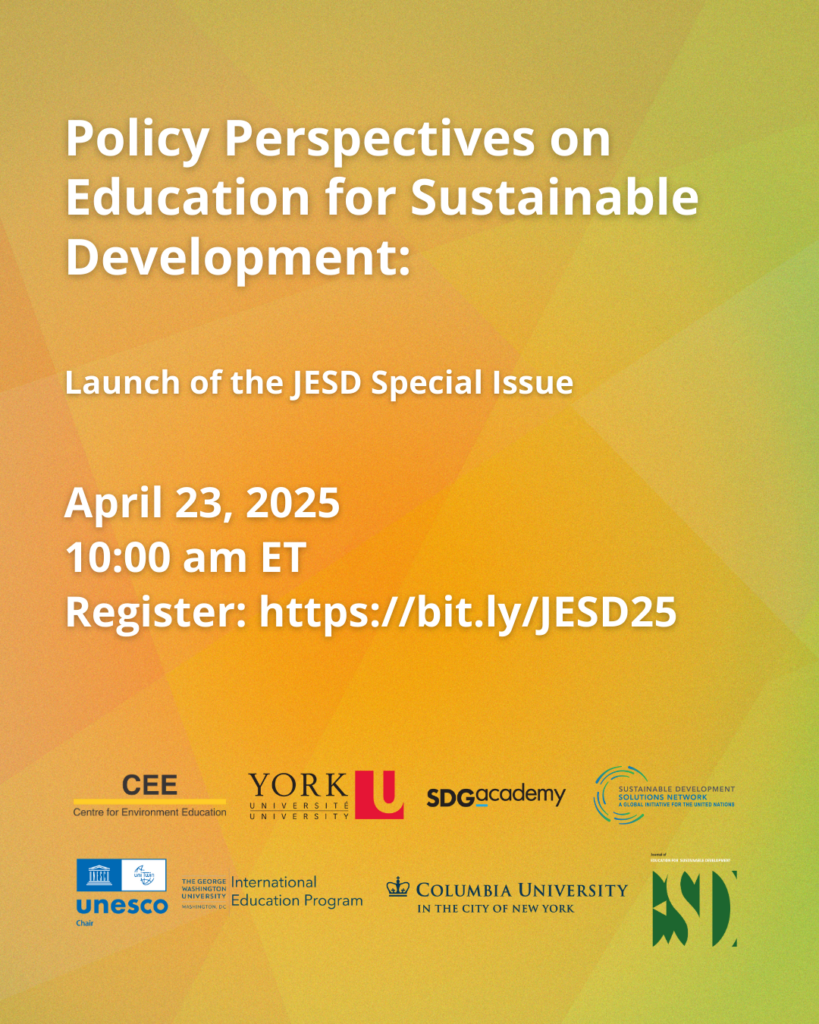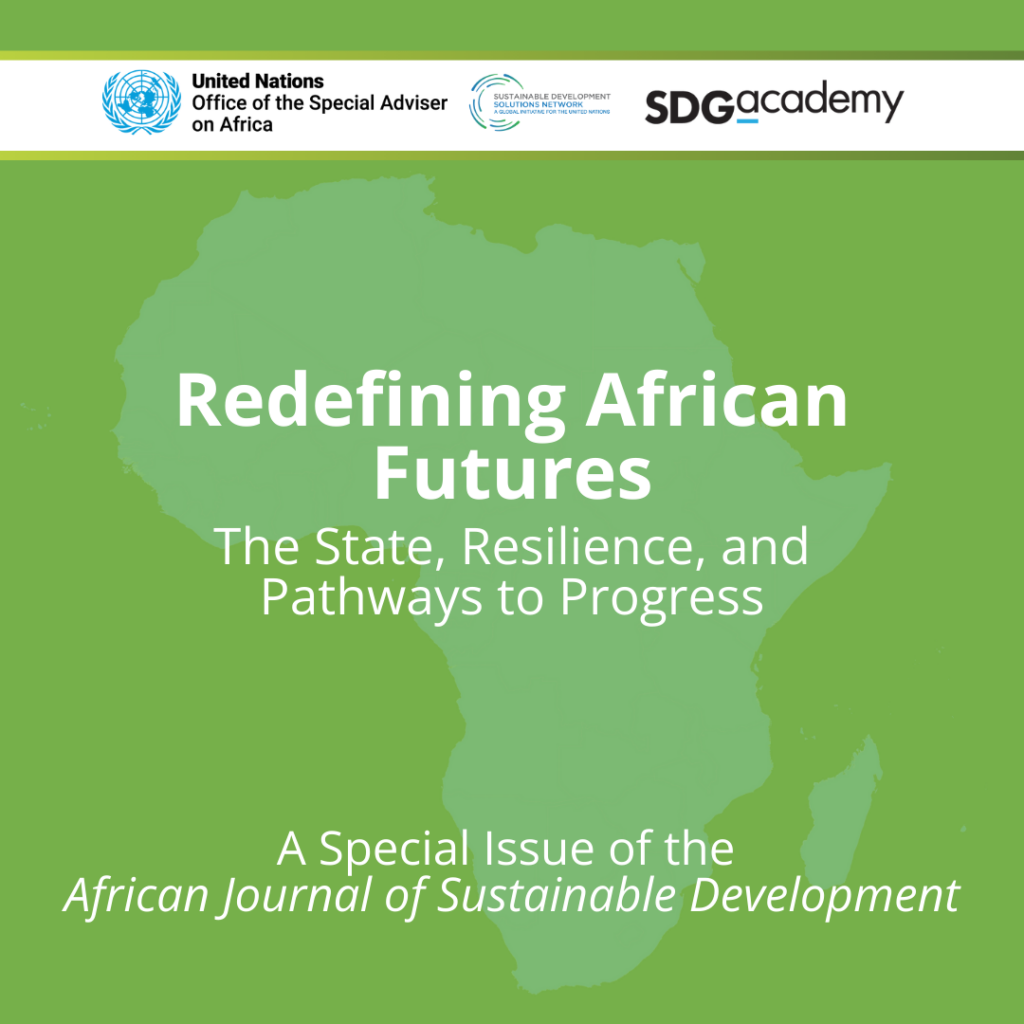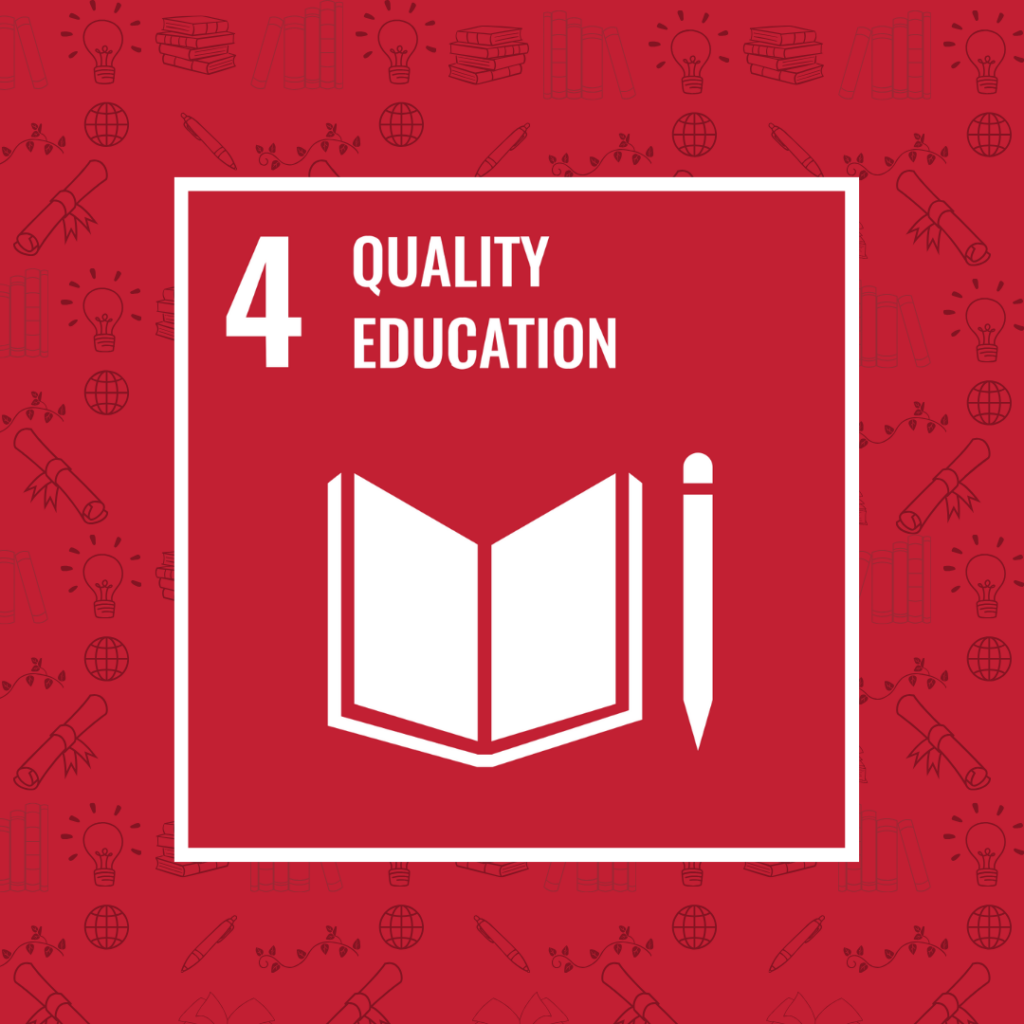SDG Academy and the UN Sustainable Development Solutions Network (SDSN) collaborate with partners to craft journal issues related to Education for Sustainable Development (ESD).
Policy Perspectives on Education for Sustainable Development

A Special Issue of the Journal of Education for Sustainable Development (JESD)
Edited by Amber Webb, Radhika Iyengar, Charles Hopkins, and Katrin Kohl
More Details
Education for Sustainable Development (ESD) has become a popular avenue to advance progress toward global goals linked to climate change, social issues, and economic growth. For more than three decades, ESD has risen to prominence in international policy fora as a fundamental step in the implementation of a wide range of global development objectives. Particularly following the adoption of the UN Sustainable Development Goals (SDGs), enthusiasm for ESD has grown rapidly. However, the current moment represents a break in the wave of support for global projects like the SDGs. Catastrophes like the COVID-19 pandemic and violent regional conflicts have elicited skepticism for global cooperation and the efforts of agencies like the United Nations (UN). Consequently, in 2024, the UN Secretary-General convened the Summit of the Future (SOTF) to revitalize multilateralism and reconcile the grievances of nations. Among those grievances were demands for more critical assessments of the transformative potential and relevance of the SDGs. Provoked by the recent global momentum, this special issue highlights key perspectives regarding how the international education community has rolled out ESD initiatives during the SDG campaign, with special focus on SDG Target 4.7. The commentaries offer valuable insights into concrete actions to enrich ESD, the evolving contours of policy production, and, more deeply, critiques on the underlying forces shaping the field. Following the SOTF, the degree to which the UN was successful in assuaging skepticism and re-mobilizing support for its mission is still to be determined. Rebuilding the trust and faith of nations is a long-term effort, but certainly, the range of voices emerging offers enriching new pathways for the field of ESD and across the development spectrum.
Abstracts
Towards Sustainable Education: The Need for “Communiversity”
Dzulkifli Abdul Razak, Abdul Rashid Moten
Preview Abstract
The technological revolution has many positive effects including making life easier, connecting people, and helping economic development. However, it has also been responsible for social isolation, mental health problems, and increased concerns around privacy and security…
Reframing Sustainability Learning – From net-zero to net-positive
Robert J. Didham
Preview Abstract
In this commentary, the idea of a stronger focus on a net-positive learning perspective and a solutions-oriented approach in education for sustainable development is proposed as a means to uplift its transformative potential and support an accelerated effort towards achieving the Sustainable Development Goals…
The Global Governance of Education for Sustainable Development: Cities as Critical Policy Spaces
Doo Rhee Lee, Imesha Ediriweera Patabendige, Jessie Wetherby, Maha Malik, and Laura Engel
Preview Abstract
This article examines the role of cities as critical spaces for advancing Education for Sustainable Development (ESD) policies within global governance. Traditionally guided by national governments, education policy-making now involves diverse actors, including international organizations and local authorities…
Rethinking Learning Assessment in Education for Sustainable Development: A Call for Action
Daniel Fischer, Jordan King, Aaron Redman
Preview Abstract
The role of assessment in Education for Sustainable Development (ESD) is in need of re-assessment. Despite its importance, assessment in ESD has been criticized for its detrimental effects on learner wellbeing, lack of innovation, and failure to adequately consider fundamental sustainability principles, limiting its integral link to learning…
Getting Asian Teachers Climate-Ready: A Transformative Initiative in Teacher Education
Hiroki FUJII and Khalifatulloh FIEl’ARDH
Preview Abstract
This commentary explores the dynamic landscape of climate change education (CCE) in Asia, spotlighting the crucial role of integrating CCE into teacher training programs. It introduces the Asian Teacher Educators for Climate Change Education (ATECCE) Network, whose impactful initiatives have catalyzed change in teacher education and community engagement…
Promise of the Future: Commentary on education for sustainable development and international policy
William Gaudelli
Preview Abstract
This commentary explores Education for Sustainable Development (ESD) and international policy, focusing on participatory decision-making, long-term planning, and education and awareness. Highlighting Sustainable Development Goal (SDG) 4.7, which emphasizes sustainability, peace, gender equality, and human rights in education, the text underscores the importance of inclusive, youth-driven participation in policy development…
Analyzing the implementation of Education for Sustainable Development (ESD) from national to school levels through bibliometric studies
Tomonori ICHINOSE
Preview Abstract
This study utilizes literature databases and correspondence between UNESCO and Japan to clarify the effectiveness of implementing UNESCO’s recommendations for Education for Sustainable Development (ESD) and examines Japan’s domestic educational policy. After the UN Decade of Education for Sustainable Development (DESD) ended in 2014, a noticeable decrease in references to ESD within the databases was observed…
The Centrality of SD/ESD Policy, Practice and Change-Oriented Methodological Approaches to Human and Global Development
Adesuwa Vanessa Agbedahin
Preview Abstract
This article contributes to the scholarship on integrating education for sustainable development (ESD) into global development frameworks, which emerges from the need to investigate and propose solutions to enrich and enhance the nexus between policy and practice…
Promoting an enhanced learning about environment through a whole school approach and non-formal education tools: a case study of GREEN Olympiad
Livleen K Kahlon, Taru Mehta, Monmi Barua, Saltanat M Kazi, Ravi S Das, Kashish Bhushan
Preview Abstract
Holistic education empowers learners’ with a transformative impact and improves their living conditions by enhancing their core competencies. A project-based learning approach helps to further facilitate environment improvement initiatives at an individual and institution level through a whole school approach, ensuring sustainability and contributing to measurable results…
Integrating critical thinking about sustainable development goals: Making biodiversity matter for business students
Dr. Helen Kopnina, Dr. Teresa Roca, Professor M. Karim Sorour
Preview Abstract
Biodiversity decline and habitat destruction have drastically accelerated in recent decades, as reported by the International Union for Conservation of Nature and the Intergovernmental Science-Policy Platform on Biodiversity and Ecosystem Services. Increasingly, national, and international legislation mandates that businesses report and manage the potential effects of their operations on biodiversity…
Harnessing Indigenous Knowledge for Education for Sustainable Development
Jun Morohashi, Julia Heiss, Mark Manns, Leila Loupis
Preview Abstract
In an era of environmental and social crises, integrating Indigenous knowledge into Education for Sustainable Development (ESD) is critical for fostering a holistic, inclusive, and effective approach to sustainability. This article explores the essential role of Indigenous knowledge in contextualizing education, highlighting its contributions to sustainable resource management, environmental stewardship, and cultural preservation…
Galvanising Education for Sustainable Development Practice through the Greening Education Partnership: Steering Green Schools Toward 2030 and Beyond
Pramod Kumar Sharma
Preview Abstract
The Greening Education Partnership (GEP) has emerged as an actionable initiative with four strategic pillars each having its measurable indicators. An outcome of the UN Secretary General’s Transformative Education Summit, GEP sets ambitious targets for countries to be achieved by 2030…
What If More Education Isn’t the Answer? Beyond the Business-as-Usual Approach to SDGs
Iveta Silova, Jeremy Rappleye, and Hikaru Komatsu
Preview Abstract
As the world approaches the 2030 deadline, the promise of education in advancing the Sustainable Development Goals (SDGs) remains unfulfilled, while the dominant educational models prevail without critical scrutiny. Our analysis dives into the SDG targets and their portrayals in seminal reports from UNESCO, the OECD, and the World Bank, revealing the heavy hand of these international bodies in shaping the global education trajectory…
Transformative learning to address 21st century challenges: plotting a pathway from endorsing international frameworks to creating a new classroom reality
Margaret Sinclair
Preview Abstract
Member states of the UN and UNESCO have committed themselves to adopt education policies and curricula that help students address 21st century challenges, from climate change and conflict to gender inequality and misuse of information channels. The 2023 UNESCO Recommendation on Education for Peace, Human Rights and Sustainable Development builds on the 2015 SDG Target 4.7…
Coming Down to Earth on Sustainable Futures and Higher Education
Noah W. Sobe
Preview Abstract
Universities have a vital role to play in any social pact for the future. For higher education to contribute to sustainable futures in which the ability of succeeding generations to chart their own flourishing futures is not compromised, a pivot is necessary…
Truly transformative? Why ESD falls short in epochal times
Stephen Sterling
Preview Abstract
This reflective article argues that despite the widespread adoption of education for sustainable development (ESD) most manifestations of ESD are not sufficiently radical. They do not effectively nurture the kinds of social learning and societal shifts that international agencies agree are urgently needed to address current unsustainable socioeconomic pathways…
Advancing Education for Sustainable Development and Roles of Higher Education Networks
Miki Sugimura
Preview Abstract
This paper clarifies the role of higher education networking in promoting Education for Sustainable Development (ESD). The significance of ESD in higher education has been recognised since the 1990s. Globalisation and internationalisation emphasise the importance of creating partnerships through networking and international collaboration…
Transforming Knowledge and Research for Just and Sustainable Futures: Implications for higher education policy and practice
Leon Tikly
Preview Abstract
The article starts by making a case as to why it is necessary to transform knowledge and research. It is argued that transformation is essential for epistemic justice and to tackle the complex problems of unsustainable development…
Beyond National Frameworks: Five Critical Insights for ESD from Subnational and Urban Education Policy Studies
Carine Verschueren
Preview Abstract
In international and comparative education, the unit of analysis has traditionally and predominantly been the national education system. However, many of these systems are or have become fragmented and decentralised. This commentary therefore presents five key insights from policy studies at the subnational and particularly at the urban level to understand the field of ESD…
Education for Sustainable Development: The Quest for Ubuntu
Yusef Waghid
Preview Abstract
Undeniably, education for sustainable development can justifiably be considered as a laudable educational practice because of its purpose to foster environmental awareness and responsibility, enhance economic sustainability, cultivate critical thinking and empowerment of people, and build inclusive societies (UN, 2017). In this article I tease out three policy perspectives on education for sustainable development in the quest to cultivate a more tenable notion of higher education specifically related to the African context…
Empowering Youth-led Innovation to Accelerate Sustainable Development
Wendy Purcell, Sumie Song, Matthew Witenstein,Wen-Wen Tung, Radhika Iyengar
Preview Abstract
This paper seeks to reconceptualize education for sustainable development (ESD) with the explicit inclusion of innovation. Drawing on policy dialogues held over the past three years, including those at COP28, a Theory-of-Change framework for youth-led innovation is proposed…
Redefining African Futures: The State, Resilience, and Pathways to Progress

A Special Issue of the African Journal of Sustainable Development
Edited by Ndidi Anyaegbunam, Amber Webb, and Olawale Emmanuel Olayide.
More Details
It has never been more vital to stir critical dialogue on the work to transform multilateralism to accelerate sustainable development and build durable peace and security, including in Africa. In this context, the importance of African scholarship to the global dialogue is central, as the continent seeks to reclaim its rightful place at the global leadership table. This includes highlighting scholarship from across Africa, where the impact of an outdated international mechanism to boost the achievement of the Sustainable Development Goals (SDGs) are strongly felt.
In line with the UN Secretary-General’s call that “We can’t build a future for our grandchildren with a system built for our grandparents” in the lead up to the Summit of the Future while presenting an outcome of the Academic Conference, the UN Office of the Special Adviser on Africa (OSAA) and the SDG Academy of the Sustainable Development Solutions Network (SDSN) launched a Special Issue of the African Journal of Sustainable Development (AJSD) focused on African scholarship related to the SDGs, multilateral cooperation, and the future of global governance.
Abstracts
Forward by Cristina Duarte, Under-Secretary-General and United Nations Special Adviser on Africa
Editors’ Note by Ndidi Anyaegbunam, Amber Webb, and Olawale Emmanuel Olayide
Beyond Resource Extractivism and Comparative Advantages: The Case for Energy Transitions in Africa | Antonio Pedro and MaryAnne Iwara
Climate Change Innovations: a golden opportunity for Africa | Abel Kinyondo
Towards Access to Quality, Equitable and Inclusive Education in Post-COVID-19 Africa | Titus Pacho
Gender Contestations and the Implications for Inclusive Societies | Awino Okech
In the Margins of Political Power: Rewriting women into history | Keneilwe Sadie Mooketsane
Pandemic Risks Threaten Africa’s Sustainable Development | Tolbert Nyenswah
Expanding Social Protection in Africa: A Menu of Early Policy Ideas | Haroon Bhorat
Indigenous Social Protection in Africa: Pathways to Resilience and Sustainable Development | Zitha Mokomane
Africa Pathways to Food Systems Transformation: Challenges and Opportunities | John M. Ulimwengu
Traditional Institutions and Sustainability of African Cities and Communities | Isaac Olawale Albert
Governance and the Resilience of Cities in Africa | Emmanuel Remi Aiyede
Evaluating the Realities of SDG 11 in Africa: Achieving Urban Sustainability by 2030— Fact or Fiction? | Nara Monkam and Charite Leta
Operationalizing Comprehensive Data Governance in Africa | Chinasa T. Okolo
Public debt, social spending, and well-being in Africa | Marcellin Stephane Bella Ngadena
Restructuring African States to Achieve Sustainable Development Goals | Kelechi A. Kalu
Lessons Learnt from Countering Militant Groups in Africa | Anouar Boukhars
Complex interlinkages between the SDGs and their importance to African development | Moira Faul and Felix Laumann
The Future of Development in Africa within the Framework of UN Policy and the 2030 Agenda | Akinlolu Olalekan Akanmu and Olubukola Oluranti Babalola
The role of youths in the global agenda: case-studies from Africa | Labode Popoola, Femi Gabriel Oyeniyi, and Emmanuel Ola-Olowoyo
Critical Perspectives at the Midpoint of the SDG 4: Progress, Promises and Pitfalls

A Special Issue of the International Journal of Educational Development
Edited by Amber Webb, M. Niaz Asadullah, and D. Brent Edwards, Jr.